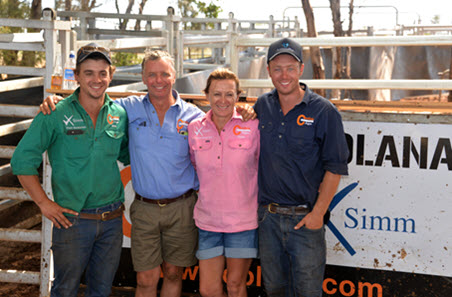Starting succession with a blank canvas
23 August 2018

LESSONS LEARNED:
- Allow the next generation to create their own business.
- Freeing up capital provides more flexibility in the way assets can be handed over to non-farming offspring.
- If you take advantage of a market high, be prepared to wait for a low to restock. In the short term, renovate some pastures and either short-term lease or take on agistment.
The crucial point in planning for succession for producers Mark and Anna Gubbins has been to lift any weight of expectation from the shoulders of the next generation.
"When I first came home to the farm, my grandfather issued me a warning about the sheep stud. He said, ‘that’s your legacy, don’t bugger it up!’ And they’re pretty heavily-weighted words in regard to his thinking," Mark said.
"Anna and I didn't want our two sons (Max and Ben) to be constrained by history (which dates back to 1930). We decided to take the buckets off them, tip them out and allow them to fill them up again in their own way."
The Gubbins family run a self-replacing prime lamb and beef enterprise across more than 6,000ha at Chatsworth, Victoria and in the Coorong, SA. Their business was one of 16 analysed for a project run by MLA Donor Company and Meridian Agriculture to develop case studies on business succession planning. The factors examined were those which led to a range of outcomes, from continuing to operate in the same way through to selling up.
The Gubbins shared their approach to setting up their business to allow their two sons the freedom to put their own stamp on it.
‘Emptying the bucket’ was an extraordinary act, considering it involved selling their cattle genetics business and dispersing their stud herd at the peak of cattle prices in 2017. Building up the stud and the herd had taken much of Mark and Anna’s focus in their 30 years of farming, and was the income generator which funded business expansion.
“I was having lunch one day with a mate and we were talking about the beef industry and he said ‘God you guys are in for a good ride’ and I said ‘yes, wouldn’t I be a silly fool if I didn’t capitalise on it?’," Mark said.
"Then I came home and said, ‘Come on guys, let’s get in the office – we’ve got to have a talk’ and that probably was the catalyst, that one conversation..
"Anna said to me last July, ‘do something about it or shut up’. She said ‘it’s not fair to keep saying to our boys, do we sell, or do we not sell?’”
The decision was to disperse the stud, and the family agreed that they would do whatever was required to bring a large number of cattle onto the market in a short time (less than six months). It was a lot of work.
"We were pretty busy, but it’s organisation, it’s planning, it’s management. You spend the time with your staff and say ‘look, in sale week this is what’s going to happen: these cattle are going to walk through a process of paddocks to the sale ring, they’re going to be available for everyone to look at on the way, but there’s this step process that we’ve got to do and we’ve all got to know what we’re doing and we’ve all got to know when it’s going to happen," Mark said.
In the end, 1,500 lots went up for sale in four days last March, including live cattle, embryos and semen. Each lot was sold through the ring individually. In order to avoid flooding the market, younger bulls were held back until September.
Now a purely commercial enterprise, the sale allowed the family to put money into superannuation for Mark and Anna, reduce labour inputs and to free up capital for the next generation to set up their businesses using the land base.
They have put some succession models in place, including a trustee management company, and a management company over the whole business with corporate trustees. This structure allows flexibility when required for the future of the business.
"If either of the children want to get into the seedstock business of breeding and selling bulls, they can start it from scratch," Mark said.
Mark and Anna’s first son Max, who is already involved in the farm business, is enjoying the challenge. Their second son, Ben, works in Queensland.
“Max did his first real budget with me the other day, which was only finishing up this financial year. I’m saying to him ‘you have to live this now; for the future, you’ve got to live this’," Mark said.
Information


